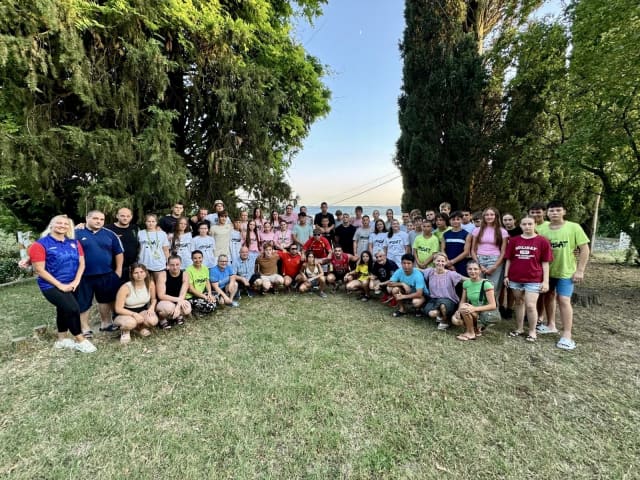The initiative brought together 49 young participants and 14 coaches from various judo clubs across Europe, including Judo Club Rijeka (Croatia), Judo Club Una (Bosnia and Herzegovina), Judo Club Liberty (Romania), Club Deportivo Elemental Newton (Spain), and Judo Golovec (Slovenia), aiming to enhance the wellbeing and mental health of young people through intercultural activities, informal learning and the principles of judo, with a strong emphasis on lifelong education and personal growth.
Highlights of the Programme:
- Cultural Exchange and Networking: Young people aged 13 to 25 had the opportunity to learn about different cultures, values and the European community, fostering mutual understanding and socialisation in a friendly and interactive environment. This exchange has created lasting networks of like-minded individuals who share judo values and other common views and ideals.
- Diverse Activities: The programme included various intercultural activities celebrating both the diverse and common European heritage of the participants. Through discussions, videos, role-plays, cultural activities, interviews, and teamwork, participants engaged in informal learning in a relaxed and interactive setting, alongside judo sessions in their free time.
- Focus on Wellbeing: Incorporating the ‘Education Through Sport’ (ETS) teaching method, the programme used sport and physical activity to develop key competencies, contributing to personal growth and sustainable social transformation. Wellbeing activities were designed around the five tools from Foresight's Mental Capital and Wellbeing project: connect, be active, pay attention, keep learning, and give, with an additional focus on healthy habits.
Daily Activities Included:
- Ice-breaker Games: team-building exercises helped participants establish connections and develop lasting relationships, setting a positive tone for each day's events.
- Intercultural Activities: participants engaged in activities promoting mutual understanding and celebrating diversity, emphasising the importance of intercultural awareness.
- Reflection Sessions: Each day concluded with a reflection session, where participants documented their experiences and learning outcomes in a reflection booklet. This daily practice ensured the achievement of set goals and addressed any emerging issues promptly.
Specific Wellbeing Activities:
- Participants explored their feelings and skills while connecting with others through reflection, group discussions, and role play.
- Morning exercise and afternoon judo activities demonstrated the positive efects of physical activity on mood and mental clarity.
- Exercises encouraged participants to appreciate their surroundings and inner feelings, fostering a deeper appreciation for life and overcoming fear.
- Activities focused on the value of giving, including discussions around compliments, ways to give back to the community and judo values.
Judo Lectures
What Does It Take to Become a World Champion?
Florin Daniel Lascau, 8th dan, world champion -78 kg in 1991, IJF Head Referee Director, IJF Academy Sport Director
Being an Olympic Referee
Raúl Camacho Pérez, 8th DAN, IJF Kata Sport Director, Paris 2024 Olympic Referee
The Importance of Lifelong Learning: Why It Matters
Slaviša Bradić, PhD, 7th dan, Education Director of the IJF Academy
Feelings: Friend or Enemy?
Nuša Lampe, 6th dan, first Slovenian international referee, IJF Education & Coaching Commission member, Paris 2024 Olympic International Technical Official
Outcomes and Impact:
The project has contributed significantly to the participants' personal growth, mental health, and wellbeing. By fostering intercultural co-operation and promoting judo values, the programme has laid the groundwork for a more inclusive society. The voluntary participation and trust-building activities have enhanced understanding, respect and acceptance of differences among young judoka, crucial for positive co-existence in the future. Nusa Lampe said, “We are excited by the positive impact this programme has made and anticipate continued growth and contributions from these young participants in their communities.”







